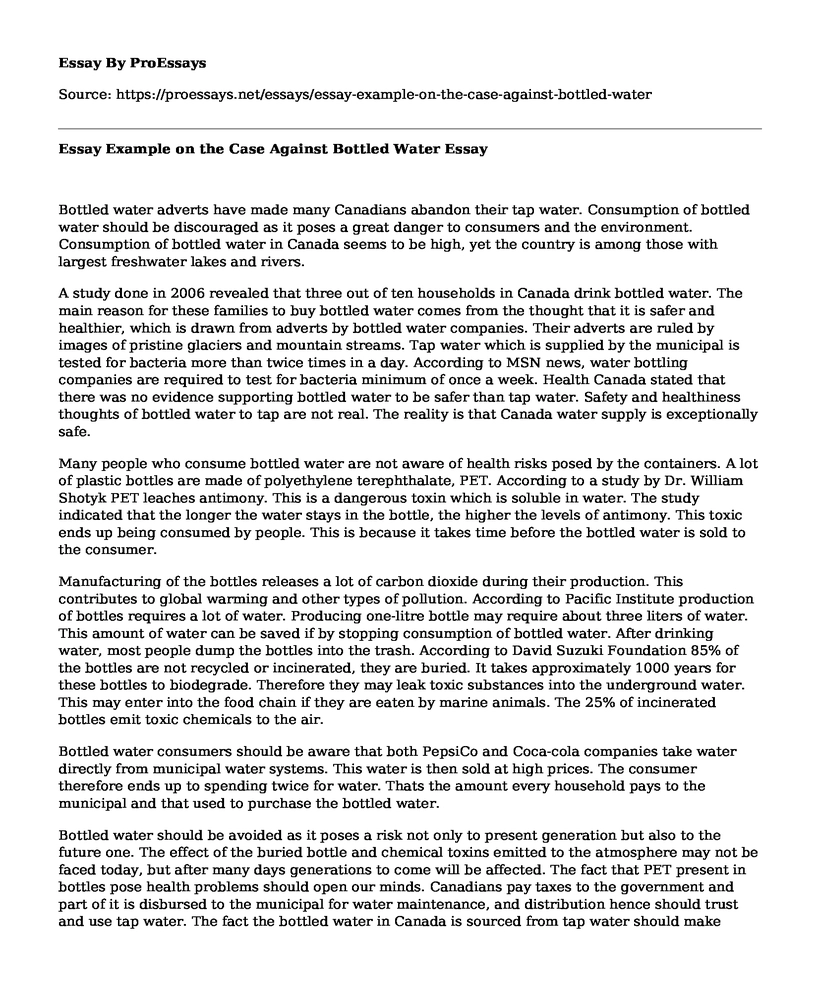Bottled water adverts have made many Canadians abandon their tap water. Consumption of bottled water should be discouraged as it poses a great danger to consumers and the environment. Consumption of bottled water in Canada seems to be high, yet the country is among those with largest freshwater lakes and rivers.
A study done in 2006 revealed that three out of ten households in Canada drink bottled water. The main reason for these families to buy bottled water comes from the thought that it is safer and healthier, which is drawn from adverts by bottled water companies. Their adverts are ruled by images of pristine glaciers and mountain streams. Tap water which is supplied by the municipal is tested for bacteria more than twice times in a day. According to MSN news, water bottling companies are required to test for bacteria minimum of once a week. Health Canada stated that there was no evidence supporting bottled water to be safer than tap water. Safety and healthiness thoughts of bottled water to tap are not real. The reality is that Canada water supply is exceptionally safe.
Many people who consume bottled water are not aware of health risks posed by the containers. A lot of plastic bottles are made of polyethylene terephthalate, PET. According to a study by Dr. William Shotyk PET leaches antimony. This is a dangerous toxin which is soluble in water. The study indicated that the longer the water stays in the bottle, the higher the levels of antimony. This toxic ends up being consumed by people. This is because it takes time before the bottled water is sold to the consumer.
Manufacturing of the bottles releases a lot of carbon dioxide during their production. This contributes to global warming and other types of pollution. According to Pacific Institute production of bottles requires a lot of water. Producing one-litre bottle may require about three liters of water. This amount of water can be saved if by stopping consumption of bottled water. After drinking water, most people dump the bottles into the trash. According to David Suzuki Foundation 85% of the bottles are not recycled or incinerated, they are buried. It takes approximately 1000 years for these bottles to biodegrade. Therefore they may leak toxic substances into the underground water. This may enter into the food chain if they are eaten by marine animals. The 25% of incinerated bottles emit toxic chemicals to the air.
Bottled water consumers should be aware that both PepsiCo and Coca-cola companies take water directly from municipal water systems. This water is then sold at high prices. The consumer therefore ends up to spending twice for water. Thats the amount every household pays to the municipal and that used to purchase the bottled water.
Bottled water should be avoided as it poses a risk not only to present generation but also to the future one. The effect of the buried bottle and chemical toxins emitted to the atmosphere may not be faced today, but after many days generations to come will be affected. The fact that PET present in bottles pose health problems should open our minds. Canadians pay taxes to the government and part of it is disbursed to the municipal for water maintenance, and distribution hence should trust and use tap water. The fact the bottled water in Canada is sourced from tap water should make those who consume stop and stay healthy.
Cite this page
Essay Example on the Case Against Bottled Water. (2021, Apr 19). Retrieved from https://proessays.net/essays/essay-example-on-the-case-against-bottled-water
If you are the original author of this essay and no longer wish to have it published on the ProEssays website, please click below to request its removal:
- Urban Heat Islands
- Conventional Farming Is Better Than Organic Farming: Argumentative Essay
- The E-Waste Problem Essay
- A Discussion on the Bhopal Disaster Essay Example
- Our Relationship With the Environment Essay Example
- Article Analysis Essay on Global Warming
- Essay Sample on Public Health and Environmental Interaction: Essential Waste Disposal Strategies







